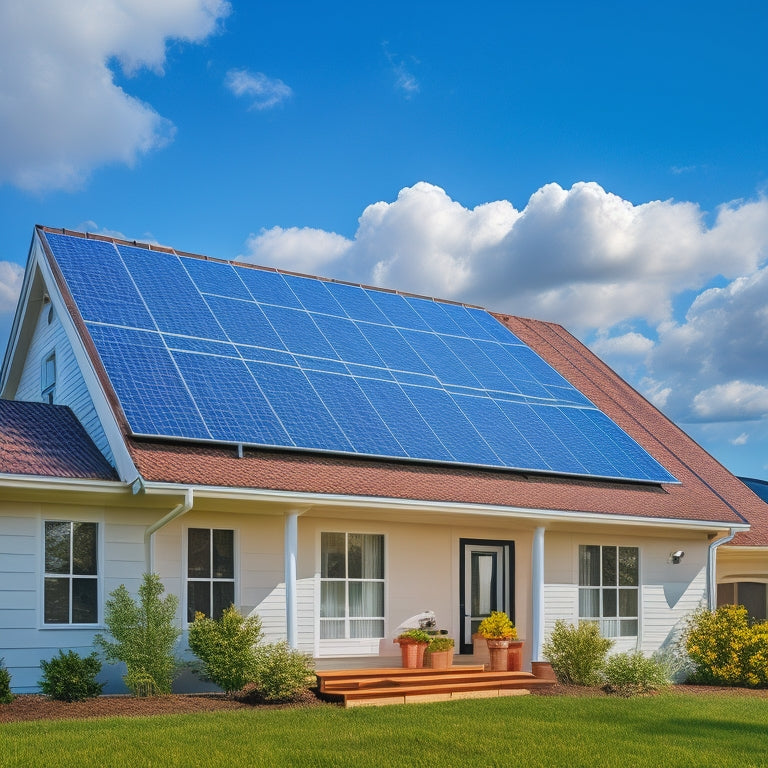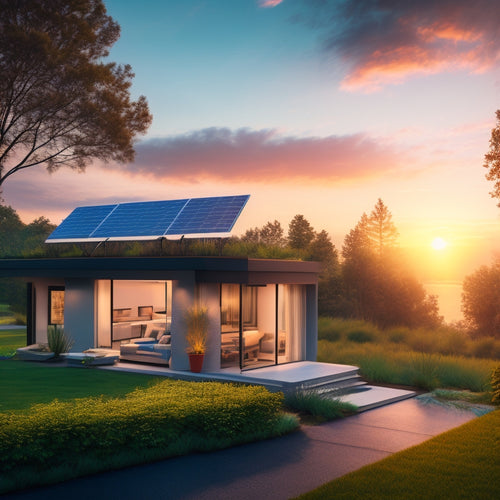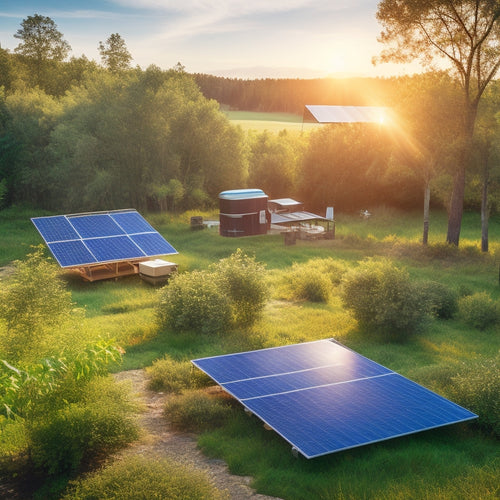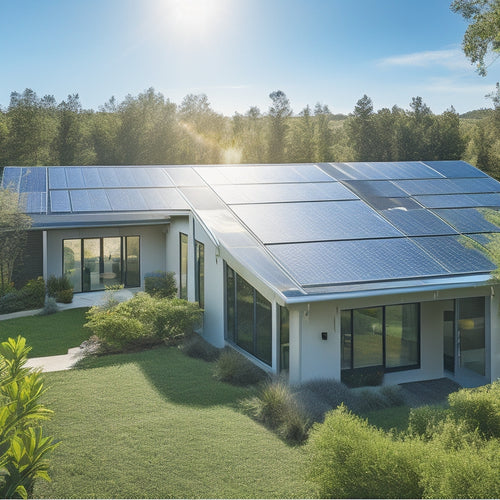
Cost of Solar Panel Installation
Share
You can expect to pay between $15,000 and $30,000 or more for a typical solar panel installation, depending on the system size, quality, and features that meet your energy needs and budget. The cost is largely influenced by the number of high-efficiency cells, wattage per square foot, and overall system performance. By installing solar panels, you'll not only save money on your monthly energy bills but also increase your property value considerably. Plus, you'll reduce your carbon footprint and contribute to a healthier environment. As you investigate the world of solar energy, you'll uncover more ways to optimize your investment and maximize your returns.
The Essentials
- The cost of solar panel installation can be offset by zero energy bills and monthly savings of hundreds of dollars on energy expenses.
- Solar panels increase property value by up to 17%, making them a sought-after feature in real estate, and boosting selling prices.
- High-efficiency solar cells and optimal installation can maximize power output, reducing the number of panels needed and increasing return on investment.
- The cost of solar panel installation can be justified by long-term savings on energy bills, financial incentives, and increased property value.
- Solar panels have a significant environmental impact, reducing carbon footprint and promoting a healthier environment by generating electricity from sunlight.
Zero Energy Bills Guaranteed
As you consider solar panel installation, you're likely drawn to the promise of energy independence and significant monthly savings.
By investing in solar power and battery storage solutions, you can tackle three major concerns at once: reducing your electricity bills, providing backup power during outages, and minimizing your carbon footprint Renewable Energy Solutions.
With a zero energy bill guarantee, you can rest assured that your solar panel system will cover your energy needs, eliminating your reliance on the grid.
Energy Independence Now
Achieving energy independence is now a realistic goal with the latest advancements in solar panel technology. You can break free from reliance on traditional energy sources and take control of your energy needs.
With a solar panel installation, you'll be utilizing renewable resources to power your home or business, reducing your carbon footprint and contributing to a cleaner environment. By investing in an off-grid solar system, you can minimize your reliance on the grid and enjoy uninterrupted power supply wherever you are.
As you shift to energy autonomy, you'll enjoy the freedom from fluctuating energy prices and the uncertainty of fossil fuel availability. You'll be generating your own clean energy, reducing your reliance on the grid, and shielding yourself from future energy crises.
With a solar panel system, you'll be producing electricity on-site, using a decentralized and sustainable energy model.
Save Money Monthly
With a solar panel installation, you can save up to hundreds of dollars on your monthly energy bills, and in many cases, eliminate them entirely. This significant reduction in your energy expenses translates to substantial monthly savings, which can be allocated to other essential expenses or invested in other aspects of your life.
By utilizing the power of renewable energy, you can enjoy budget-friendly options that won't dent your wallet. In addition, solar power systems for your house can provide a reliable and independent source of energy, perfect for those in areas prone to power outages or off-grid living Off Grid Solar Power.
Moreover, solar panels require minimal maintenance, ensuring that your monthly savings aren't offset by high upkeep costs. This means you can enjoy a significant reduction in your energy bills without worrying about additional expenses.
With solar panels, you can lock in a fixed energy rate, protecting you from rising energy costs and providing a sense of financial security. By going solar, you can take control of your energy expenses, enjoying the freedom to allocate your hard-earned money as you see fit.
Increases Property Value Fast
You'll reap significant benefits when you install solar panels, as they enhance your property's selling price and add long-term value.
Not only do they reduce your reliance on the grid, but they also enable you to take advantage of renewable energy credits and increase your energy independence.
In fact, studies have shown that solar panels can increase your property's value by up to 17%.
Boosts Selling Price
One substantial advantage of installing solar panels is that they can greatly enhance your property's selling price. This is because solar panels have become a highly sought-after feature in today's real estate market.
As you consider selling your property, having solar panels installed can be a major selling point, attracting potential buyers who value energy efficiency and sustainability.
Increased demand for eco-friendly homes has led to a surge in market trends favoring properties with solar panels. In fact, studies have shown that homes with solar panels sell faster and for a higher price than those without.
This is because buyers are willing to pay a premium for the long-term savings and environmental benefits that solar panels provide. By installing solar panels, you can reap the benefits of increased property value and appeal to a wider range of potential buyers.
This can lead to a faster and more profitable sale, giving you the freedom to move forward with your plans.
Adds Long-Term Value
Solar panels become a permanent fixture of your property, greatly enhancing its value over time. As a homeowner, you'll enjoy increased property value, which can lead to a higher selling price if you decide to sell in the future. The installation process not only benefits the environment but also provides financial incentives that can offset the initial cost.
| Benefit | Description |
|---|---|
| Increased Property Value | Solar panels can increase your property value by up to 17% |
| Financial Incentives | Receive tax credits and rebates for installing solar panels |
| Long-Term Savings | Reduce your energy bills and enjoy long-term savings |
High-Efficiency Cells Explained
You're likely familiar with the concept of cell efficiency ratings in solar panels, but what exactly do these ratings mean?
Fundamentally, they measure a cell's ability to convert sunlight into electrical energy. High-efficiency cells are typically made from high-quality silicon, which allows them to achieve higher energy efficiency ratings.
Additionally, they're often paired with microinverters to optimize power output. As you investigate high-efficiency cells, you'll want to take into account both cell efficiency ratings and maximum power output to get the most out of your solar panel installation.
Cell Efficiency Ratings
Efficiency ratings are a critical aspect of solar panel performance, and high-efficiency cells are a key factor in maximizing energy production. When you're considering solar panel installation, you should know that cell efficiency ratings vary depending on the type of cells used. Monocrystalline silicon cells, for instance, have higher efficiency ratings than polycrystalline silicon cells.
You should also consider installation factors that impact efficiency, such as panel angle, shading, and temperature. Performance degradation over time is another critical factor, as it affects the overall energy output of your solar panel system.
Look for manufacturers that offer warranty options with minimal performance degradation guarantees. Research competitive brands and market trends to find the best option for your needs. Additionally, consider the environmental impact and maintenance costs associated with different cell types.
Government incentives may also be available for installations that meet certain efficiency standards. Finally, verify that your solar panel system is compatible with the grid integration requirements in your area.
Maximum Power Output
What determines the maximum power output of a solar panel system? It's the combination of factors like panel efficiency, temperature, and irradiance. You want to maximize your system's power output to get the most out of your investment. High-efficiency cells play a significant role in achieving this.
These cells are designed to convert a higher percentage of sunlight into electricity, resulting in maximum efficiency. The process is called power conversion. When you opt for high-efficiency cells, you can expect a higher power output per unit area. This means you'll need fewer panels to achieve the same level of electricity generation, which can lead to cost savings.
When it comes to temperature, it's vital to take into account the temperature coefficient. A lower coefficient guarantees that your system's power output remains stable even in high temperatures.
Irradiance, or the amount of sunlight your system receives, also impacts power output. By optimizing these factors, you can increase your system's maximum power output and enjoy a greater return on your investment.
Wattage per Square Foot
When considering solar panel installation, you need to understand the concept of wattage per square foot, which is directly tied to solar panel density.
This density is typically measured in watts per square foot (W/ft²), and it varies among solar panels due to differences in efficiency and design.
As you investigate off-grid energy solutions, you'll find that high-efficiency solar panels can provide more power in smaller spaces.
Solar Panel Density
As you examine the world of solar panels, you'll likely come across the term "solar panel density," which refers to the measure of a panel's wattage per square foot. This metric is essential in determining the efficiency of solar technology and its environmental impact. A higher solar panel density means more energy can be generated per unit area, leading to better performance optimization and efficiency improvements.
When evaluating solar panels, you should consider factors that affect density, such as panel materials and system design. For instance, high-efficiency panels made from advanced materials can achieve higher densities, resulting in more power per square foot.
On the other hand, installation factors like roof size and orientation can also impact density.
As you investigate the market, you'll notice that solar panel density is influenced by market trends and deployment challenges. Manufacturers are continually working to improve density through advances in energy conversion and system design, driving down costs and increasing adoption.
Wattage Variance Analysis
Your solar panel's wattage per square foot is a critical metric in evaluating its performance, and a thorough wattage variance analysis can help you understand the implications of this measurement on your installation's overall efficiency.
This analysis involves examining the wattage fluctuation across different panels and identifying patterns or anomalies that could impact your solar performance.
By conducting a wattage variance analysis, you'll be able to pinpoint areas where your installation might be underperforming. For instance, if certain panels are consistently producing lower wattage per square foot, it may indicate issues with panel quality, installation, or maintenance.
Conversely, panels with higher wattage per square foot could suggest opportunities for enhancement or upgrade.
A thorough analysis will also help you identify the best panel configuration for your specific installation, ensuring you're getting the most out of your solar investment.
Low Carbon Footprint Guaranteed
You're investing in a clean energy solution with solar panels, which generate electricity from sunlight, producing no emissions or pollution.
This eco-friendly energy source is a significant step towards reducing your carbon footprint, and you can rest assured that your solar panel installation will contribute minimally to climate change.
Eco-Friendly Energy Source
More than 70% of the world's energy is currently generated from fossil fuels, which release massive amounts of greenhouse gases into the atmosphere, contributing to climate change.
You're likely aware of the devastating environmental impact of traditional energy sources. That's why you're considering switching to a cleaner, eco-friendly energy source.
Solar energy benefits the environment in numerous ways. It's a renewable energy source that reduces your reliance on fossil fuels, decreasing your carbon footprint considerably.
By installing solar panels, you'll not only reduce greenhouse gas emissions but also minimize air pollution. As a result, you'll be contributing to a healthier environment and mitigating climate change.
Solar energy is a guilt-free way to power your home, giving you the freedom to live life on your own terms.
With solar panels, you'll enjoy a clean conscience, knowing you're doing your part to protect the planet for future generations.
Frequently Asked Questions
Can I Install Solar Panels on My Own?
You can attempt a DIY solar installation, but be prepared to tackle complex electrical and mechanical challenges, guaranteeing you have the necessary knowledge and safety precautions to avoid risks and guarantee a successful, code-compliant setup.
Are Solar Panels Durable in Extreme Weather?
You'll be relieved to know that solar panels are built to last, with a typical lifespan of 25-30 years, and are designed to withstand extreme weather conditions, such as hail, high winds, and heavy snow, ensuring your energy independence.
Do Solar Panels Work During Power Outages?
During Hurricane Maria, Tesla's solar-powered battery system kept a hospital running. You can achieve grid independence too, with solar panels and a solar battery, ensuring you have power during outages, even when the grid goes dark.
Can I Install Solar Panels on a Metal Roof?
You can install solar panels on a metal roof, leveraging its advantages, such as durability and ease of installation. However, consider factors like roof type, material, and condition, as well as additional structural support requirements, before proceeding with your installation.
Does Solar Panel Installation Require a Permit?
You'll need to maneuver through solar installation regulations, as obtaining permits is typically required for a solar panel installation. You'll need to comply with local building codes and zoning laws, so be prepared to invest time in the permitting process.
Final Thoughts
You've weighed the benefits of solar panel installation, from zero energy bills to increased property value. Now, you're likely wondering about the cost. A common concern is that high-efficiency cells will break the bank. However, with advancements in technology, the cost per watt has decreased remarkably. In fact, the average cost of solar panel installation has dropped by over 70% in the last decade. With the long-term savings and environmental benefits, the initial investment is well worth it.
Related Posts
-

The Future of Residential Energy Storage
The future of residential energy storage looks promising and cost-effective for you. With lithium-ion battery prices ...
-

Top Off Grid Solar Batteries for Renewable Energy
When seeking top off-grid solar batteries for renewable energy, consider options with advanced battery chemistry, suc...
-

Installing Metal Solar Roofs for Maximum Energy Efficiency
Installing metal solar roofs can drastically enhance your home's energy efficiency and durability. These roofs withst...


